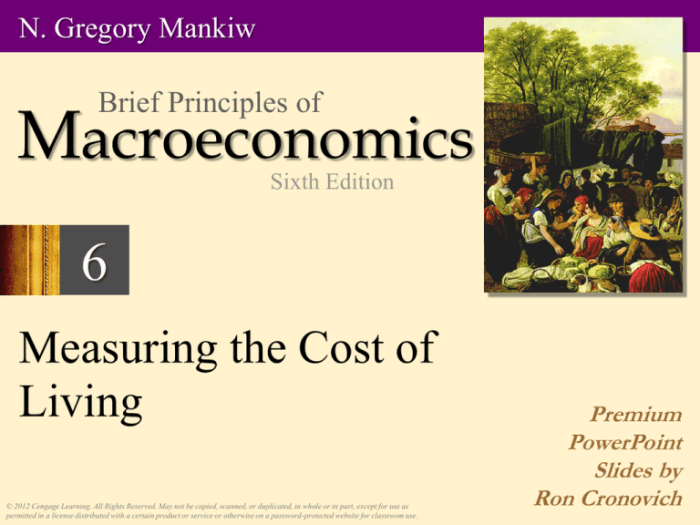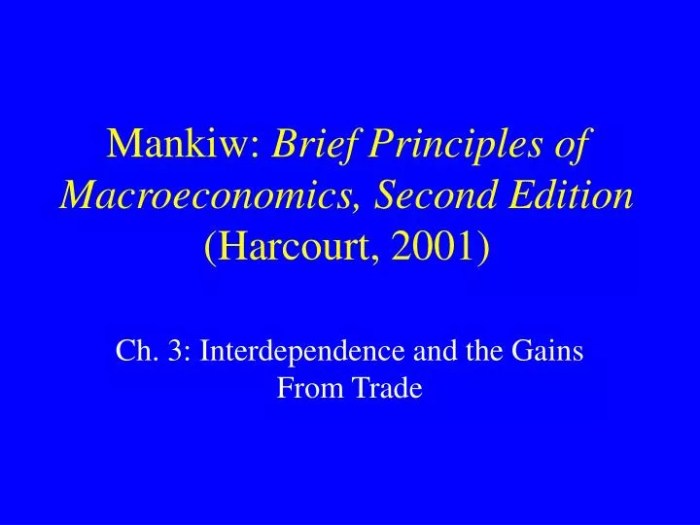Brief principles of macroeconomics 9th edition – Embark on an enlightening journey with Brief Principles of Macroeconomics, 9th Edition. This comprehensive guide unveils the intricacies of macroeconomics, empowering you with a profound understanding of economic policymaking and its impact on our world.
Delve into the complexities of national income, unemployment, and economic growth, gaining insights into the interplay between these vital economic indicators. Explore the role of money and banking in shaping economic activity, and delve into the nuances of fiscal and monetary policies, unraveling their impact on economic stability.
Introduction
Macroeconomics studies the behavior of the economy as a whole, including its output, employment, and price level. It plays a vital role in economic policymaking, as governments use macroeconomic tools to manage economic fluctuations and promote economic growth.
National Income and Price Level: Brief Principles Of Macroeconomics 9th Edition

National income measures the total value of goods and services produced in an economy. It can be divided into several components, including consumption, investment, government spending, and net exports. The price level is the average level of prices in an economy, and it is closely related to national income.
Components of National Income
- Consumption: Spending by households on goods and services.
- Investment: Spending by businesses on capital goods, such as machinery and equipment.
- Government spending: Spending by government on goods and services, such as education and healthcare.
- Net exports: Exports minus imports.
Economic Growth and Unemployment
Economic growth refers to the increase in an economy’s output over time. It can be driven by factors such as technological progress, population growth, and capital accumulation. Unemployment occurs when people are willing and able to work but cannot find jobs.
It can have significant economic and social consequences.
Determinants of Economic Growth
- Technological progress: New technologies can increase productivity and output.
- Population growth: A growing population can provide more labor and increase demand.
- Capital accumulation: Investment in capital goods can increase the productive capacity of an economy.
Money and Banking

Money is a medium of exchange, a store of value, and a unit of account. It can be in various forms, such as cash, checks, and electronic funds transfers. Banks play a crucial role in the financial system by accepting deposits, making loans, and providing other financial services.
Functions of Money
- Medium of exchange: Facilitates the exchange of goods and services.
- Store of value: Can be held over time to preserve purchasing power.
- Unit of account: Measures the value of goods and services.
Fiscal Policy
Fiscal policy refers to the use of government spending and taxation to influence economic activity. Governments can increase spending or cut taxes to stimulate economic growth or reduce inflation. Fiscal policy can be an effective tool for managing the economy, but it can also have long-term consequences.
Tools of Fiscal Policy, Brief principles of macroeconomics 9th edition
- Government spending: Can be increased to stimulate economic growth.
- Taxation: Can be reduced to increase disposable income and stimulate spending.
Expert Answers
What are the key components of national income?
National income encompasses consumption, investment, government spending, and net exports.
How does economic growth affect unemployment?
Economic growth typically leads to increased job creation and lower unemployment rates.
What is the role of central banks in monetary policy?
Central banks regulate the money supply and interest rates to influence economic activity.
How does international trade impact economic growth?
International trade can foster economic growth by promoting specialization, competition, and access to new markets.
What are the main challenges facing economic development?
Economic development faces challenges such as poverty, inequality, lack of infrastructure, and political instability.